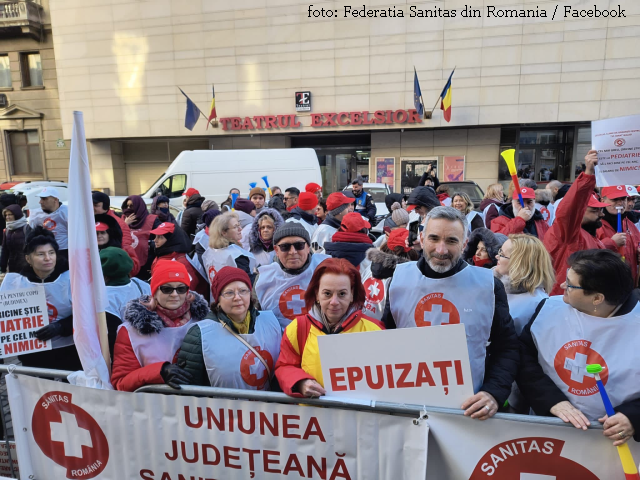Talks with healthcare trade unions
Trade unions in the healthcare sector receive promise for 15% pay rise, on top of the 5% rise from earlier this year.

Corina Cristea, 06.02.2024, 14:00
Amid
discontent related mainly to their salaries, different categories of
employees, including healthcare workers, have staged protests in
Romania in recent weeks. The representatives of the Sanitas and
Solidaritatea Sanitară trade union federations held a number of
talks with government officials, presenting them with their demands
related to salaries and staff shortages. The vice-president of
Sanitas, Răzvan Gae, explains in a social media post:
Everyone
is unhappy because benefits haven’t changed
since 2018 for some categories, or even since 2010 or 2012 for
others, and the healthcare system is faced with an acute shortage of
staff, including nurses, paramedics, administrative staff, etc.
Fortunately, the new salary scheme has brought the salaries of
primary care physicians and consultant physicians to the level where
they should be, but the rest… A first-year resident doctor doesn’t
earn more than 3,500 lei and a fourth-year resident around 4,700 lei,
including for duty hours, while a staff nurse in an outpatient
facility earns around 2,400-2,500 lei and a nurse working in the
surgery ward of a big hospital doesn’t earn more than 3,800 lei.
During
a new round of talks on Monday with prime minister Marcel Ciolacu,
trade union leaders, who requested a 20% pay rise, secured the
promise of 15%, apart from the 5% indexation earlier this year. They
agreed that the rise should be granted in two stages: 10% in March
and another 5% in June.
It
is not clear how this increase will be distributed. In a first
reaction after the talks, the representatives of Sanitas said they
did not have all the figures about the number of people working in
the healthcare sector and were collecting them, which would allow
them to establish how big the rise is. Once they have these figures,
they will decide whether to continue with the protest action. On the
other hand, the representatives of Solidaritatea Sanitară said
salaries would not in effect go up by 20% as the government claims,
but less, because the increase applies to the base salary, excepting
benefits, so the rise is in fact at almost 14%. They plan to
continue negotiations with the government, as well as protests,
including a rally outside the government headquarters on 11th
March, after which they will decide whether to go on a general
strike, depending on how many employees are in favour of this move. (CM)






























